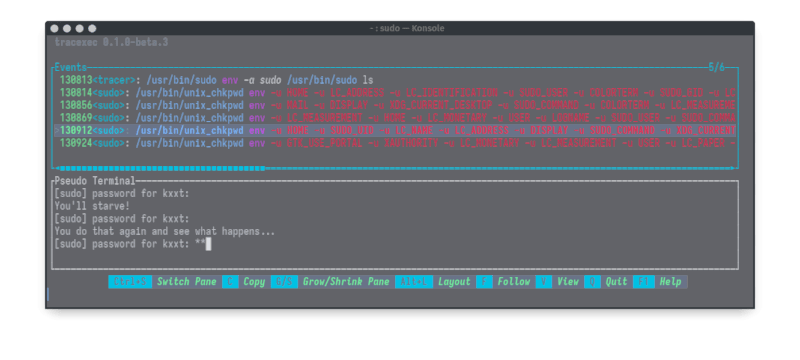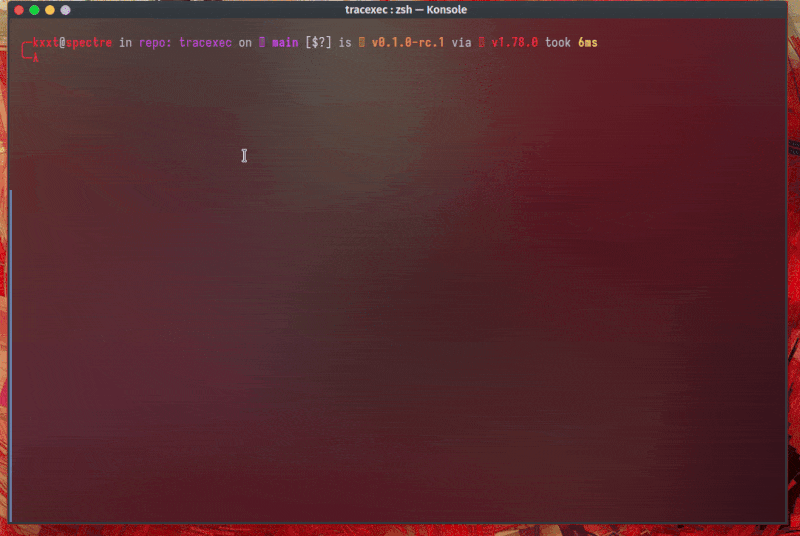60 releases (12 breaking)
Uses new Rust 2024
| 0.12.0 | May 5, 2025 |
|---|---|
| 0.10.0 | Feb 24, 2025 |
| 0.8.0 | Oct 27, 2024 |
| 0.5.1 | Jul 20, 2024 |
| 0.0.4 | Nov 10, 2023 |
#49 in Debugging
372 downloads per month
8MB
15K
SLoC
tracexec
A small utility for tracing execve{,at} and pre-exec behavior.
tracexec helps you to figure out what and how programs get executed when you execute a command.
It's useful for debugging build systems, understanding what shell scripts actually do, figuring out what programs does a proprietary software run, etc.
Showcases
TUI mode with pseudo terminal
In TUI mode with a pseudo terminal, you can view the details of exec events and interact with the processes within the pseudo terminal at ease.

Tracing setuid binaries
With root privileges, you can also trace setuid binaries and see how they work. But do note that this is not compatible with seccomp-bpf optimization so it is much less performant. You can use eBPF mode which is more performant in such scenarios.
sudo tracexec --user $(whoami) tui -t -- sudo ls

Nested setuid binary tracing is also possible: A real world use case is to trace extra-x86_64-build(Arch Linux's build tool that requires sudo):

In this real world example, we can easily see that _FORTIFY_SOURCE is redefined from 2 to 3, which lead to a compiler error.
Use tracexec as a debugger launcher
tracexec can also be used as a debugger launcher to make debugging programs easier. For example, it's not trivial or convenient to debug a program executed by a shell/python script(which can use pipes as stdio for the program). The following video shows how to use tracexec to launch gdb to detach two simple programs piped together by a shell script.
https://github.com/kxxt/tracexec/assets/18085551/72c755a5-0f2f-4bf9-beb9-98c8d6b5e5fd
Please read the gdb-launcher example for more details.
eBPF mode
The eBPF mode is currently experimental.
It is known to work on Linux 6.6 lts and 6.10 and probably works on all 6.x kernels.
For kernel versions less than 6.2, you'll need to enable ebpf-no-rcu-kfuncs feature.
It won't work on kernel version < 5.17.
The following examples shows how to use eBPF in TUI mode.
The eBPF command also supports regular log and collect subcommands.
System-wide Exec Tracing
sudo -E tracexec ebpf tui
Follow Fork mode with eBPF
sudo -E tracexec --user $(whoami) ebpf tui -t -- bash
Log mode
In log mode, by default, tracexec will print filename, argv and the diff of the environment variables and file descriptors.
example: tracexec log -- bash (In an interactive bash shell)
Reconstruct the command line with --show-cmdline
$ tracexec log --show-cmdline -- <command>
# example:
$ tracexec log --show-cmdline -- firefox
Try to reproduce stdio in the reconstructed command line
--stdio-in-cmdline and --fd-in-cmdline can be used to reproduce(hopefully) the stdio used by a process.
But do note that the result might be inaccurate when pipes, sockets, etc are involved.
tracexec log --show-cmdline --stdio-in-cmdline -- bash
Show the interpreter indicated by shebang with --show-interpreter
And show the cwd with --show-cwd.
$ tracexec log --show-interpreter --show-cwd -- <command>
# example: Running Arch Linux makepkg
$ tracexec log --show-interpreter --show-cwd -- makepkg -f
Usage
General CLI help:
Tracer for execve{,at} and pre-exec behavior, launcher for debuggers.
Usage: tracexec [OPTIONS] <COMMAND>
Commands:
log Run tracexec in logging mode
tui Run tracexec in TUI mode, stdin/out/err are redirected to /dev/null by default
generate-completions Generate shell completions for tracexec
collect Collect exec events and export them
ebpf Experimental ebpf mode
help Print this message or the help of the given subcommand(s)
Options:
--color <COLOR> Control whether colored output is enabled. This flag has no effect on TUI mode. [default: auto] [possible values: auto, always, never]
-C, --cwd <CWD> Change current directory to this path before doing anything
-P, --profile <PROFILE> Load profile from this path
--no-profile Do not load profiles
-u, --user <USER> Run as user. This option is only available when running tracexec as root
-h, --help Print help
-V, --version Print version
TUI Mode:
Run tracexec in TUI mode, stdin/out/err are redirected to /dev/null by default
Usage: tracexec tui [OPTIONS] -- <CMD>...
Arguments:
<CMD>... command to be executed
Options:
--successful-only
Only show successful calls
--fd-in-cmdline
[Experimental] Try to reproduce file descriptors in commandline. This might result in an unexecutable cmdline if pipes, sockets, etc. are involved.
--stdio-in-cmdline
[Experimental] Try to reproduce stdio in commandline. This might result in an unexecutable cmdline if pipes, sockets, etc. are involved.
--resolve-proc-self-exe
Resolve /proc/self/exe symlink
--no-resolve-proc-self-exe
Do not resolve /proc/self/exe symlink
--hide-cloexec-fds
Hide CLOEXEC fds
--no-hide-cloexec-fds
Do not hide CLOEXEC fds
--timestamp
Show timestamp information
--no-timestamp
Do not show timestamp information
--inline-timestamp-format <INLINE_TIMESTAMP_FORMAT>
Set the format of inline timestamp. See https://docs.rs/chrono/latest/chrono/format/strftime/index.html for available options.
--seccomp-bpf <SECCOMP_BPF>
Controls whether to enable seccomp-bpf optimization, which greatly improves performance [default: auto] [possible values: auto, on, off]
--tracer-delay <TRACER_DELAY>
Delay between polling, in microseconds. The default is 500 when seccomp-bpf is enabled, otherwise 1.
--show-all-events
Set the default filter to show all events. This option can be used in combination with --filter-exclude to exclude some unwanted events.
--filter <FILTER>
Set the default filter for events. [default: warning,error,exec,tracee-exit]
--filter-include <FILTER_INCLUDE>
Aside from the default filter, also include the events specified here. [default: <empty>]
--filter-exclude <FILTER_EXCLUDE>
Exclude the events specified here from the default filter. [default: <empty>]
-t, --tty
Allocate a pseudo terminal and show it alongside the TUI
-f, --follow
Keep the event list scrolled to the bottom
--terminate-on-exit
Instead of waiting for the root child to exit, terminate when the TUI exits
--kill-on-exit
Instead of waiting for the root child to exit, kill when the TUI exits
-A, --active-pane <ACTIVE_PANE>
Set the default active pane to use when TUI launches [possible values: terminal, events]
-L, --layout <LAYOUT>
Set the layout of the TUI when it launches [possible values: horizontal, vertical]
-F, --frame-rate <FRAME_RATE>
Set the frame rate of the TUI (60 by default)
-m, --max-events <MAX_EVENTS>
Max number of events to keep in TUI (0=unlimited)
-D, --default-external-command <DEFAULT_EXTERNAL_COMMAND>
Set the default external command to run when using "Detach, Stop and Run Command" feature in Hit Manager
-b, --add-breakpoint <BREAKPOINTS>
Add a new breakpoint to the tracer. This option can be used multiple times. The format is <syscall-stop>:<pattern-type>:<pattern>, where syscall-stop can be sysenter or sysexit, pattern-type can be argv-regex, in-filename or exact-filename. For example, sysexit:in-filename:/bash
-h, --help
Print help
Log Mode:
Run tracexec in logging mode
Usage: tracexec log [OPTIONS] -- <CMD>...
Arguments:
<CMD>... command to be executed
Options:
--more-colors
More colors
--less-colors
Less colors
--show-cmdline
Print commandline that (hopefully) reproduces what was executed. Note: file descriptors are not handled for now.
--no-show-cmdline
Don't print commandline that (hopefully) reproduces what was executed.
--show-interpreter
Try to show script interpreter indicated by shebang
--no-show-interpreter
Do not show script interpreter indicated by shebang
--foreground
Set the terminal foreground process group to tracee. This option is useful when tracexec is used interactively. [default]
--no-foreground
Do not set the terminal foreground process group to tracee
--diff-fd
Diff file descriptors with the original std{in/out/err}
--no-diff-fd
Do not diff file descriptors
--show-fd
Show file descriptors
--no-show-fd
Do not show file descriptors
--diff-env
Diff environment variables with the original environment
--no-diff-env
Do not diff environment variables
--show-env
Show environment variables
--no-show-env
Do not show environment variables
--show-comm
Show comm
--no-show-comm
Do not show comm
--show-argv
Show argv
--no-show-argv
Do not show argv
--show-filename
Show filename
--no-show-filename
Do not show filename
--show-cwd
Show cwd
--no-show-cwd
Do not show cwd
--decode-errno
Decode errno values
--no-decode-errno
Do not decode errno values
--successful-only
Only show successful calls
--fd-in-cmdline
[Experimental] Try to reproduce file descriptors in commandline. This might result in an unexecutable cmdline if pipes, sockets, etc. are involved.
--stdio-in-cmdline
[Experimental] Try to reproduce stdio in commandline. This might result in an unexecutable cmdline if pipes, sockets, etc. are involved.
--resolve-proc-self-exe
Resolve /proc/self/exe symlink
--no-resolve-proc-self-exe
Do not resolve /proc/self/exe symlink
--hide-cloexec-fds
Hide CLOEXEC fds
--no-hide-cloexec-fds
Do not hide CLOEXEC fds
--timestamp
Show timestamp information
--no-timestamp
Do not show timestamp information
--inline-timestamp-format <INLINE_TIMESTAMP_FORMAT>
Set the format of inline timestamp. See https://docs.rs/chrono/latest/chrono/format/strftime/index.html for available options.
--seccomp-bpf <SECCOMP_BPF>
Controls whether to enable seccomp-bpf optimization, which greatly improves performance [default: auto] [possible values: auto, on, off]
--tracer-delay <TRACER_DELAY>
Delay between polling, in microseconds. The default is 500 when seccomp-bpf is enabled, otherwise 1.
--show-all-events
Set the default filter to show all events. This option can be used in combination with --filter-exclude to exclude some unwanted events.
--filter <FILTER>
Set the default filter for events. [default: warning,error,exec,tracee-exit]
--filter-include <FILTER_INCLUDE>
Aside from the default filter, also include the events specified here. [default: <empty>]
--filter-exclude <FILTER_EXCLUDE>
Exclude the events specified here from the default filter. [default: <empty>]
-o, --output <OUTPUT>
Output, stderr by default. A single hyphen '-' represents stdout.
-h, --help
Print help
Collect and export data:
Collect exec events and export them
Usage: tracexec collect [OPTIONS] --format <FORMAT> -- <CMD>...
Arguments:
<CMD>... command to be executed
Options:
--successful-only
Only show successful calls
--fd-in-cmdline
[Experimental] Try to reproduce file descriptors in commandline. This might result in an unexecutable cmdline if pipes, sockets, etc. are involved.
--stdio-in-cmdline
[Experimental] Try to reproduce stdio in commandline. This might result in an unexecutable cmdline if pipes, sockets, etc. are involved.
--resolve-proc-self-exe
Resolve /proc/self/exe symlink
--no-resolve-proc-self-exe
Do not resolve /proc/self/exe symlink
--hide-cloexec-fds
Hide CLOEXEC fds
--no-hide-cloexec-fds
Do not hide CLOEXEC fds
--timestamp
Show timestamp information
--no-timestamp
Do not show timestamp information
--inline-timestamp-format <INLINE_TIMESTAMP_FORMAT>
Set the format of inline timestamp. See https://docs.rs/chrono/latest/chrono/format/strftime/index.html for available options.
--seccomp-bpf <SECCOMP_BPF>
Controls whether to enable seccomp-bpf optimization, which greatly improves performance [default: auto] [possible values: auto, on, off]
--tracer-delay <TRACER_DELAY>
Delay between polling, in microseconds. The default is 500 when seccomp-bpf is enabled, otherwise 1.
-F, --format <FORMAT>
the format for exported exec events [possible values: json-stream, json]
-p, --pretty
prettify the output if supported
-o, --output <OUTPUT>
Output, stderr by default. A single hyphen '-' represents stdout.
--foreground
Set the terminal foreground process group to tracee. This option is useful when tracexec is used interactively. [default]
--no-foreground
Do not set the terminal foreground process group to tracee
-h, --help
Print help
eBPF backend supports similar commands:
Experimental ebpf mode
Usage: tracexec ebpf <COMMAND>
Commands:
log Run tracexec in logging mode
tui Run tracexec in TUI mode, stdin/out/err are redirected to /dev/null by default
collect Collect exec events and export them
help Print this message or the help of the given subcommand(s)
Options:
-h, --help Print help
Profile
tracexec can be configured with a profile file. The profile file is a toml file that can be used to set fallback options.
The profile file should be placed at $XDG_CONFIG_HOME/tracexec/ or $HOME/.config/tracexec/ and named config.toml.
A template profile file can be found at https://github.com/kxxt/tracexec/blob/main/config.toml
As a warning, the profile format is not stable yet and may change in the future. You may need to update your profile file when upgrading tracexec.
Known issues
- Non UTF-8 strings are converted to UTF-8 in a lossy way, which means that the output may be inaccurate.
- For eBPF backend, it might be impossible to show some details of the tracee, See https://mozillazg.com/2024/03/ebpf-tracepoint-syscalls-sys-enter-execve-can-not-get-filename-argv-values-case-en.html
- The output is not stable yet, which means that the output may change in the future.
- Test coverage is not good enough.
- The pseudo terminal can't pass through certain key combinations and terminal features.
Origin
This project was born out of the need to trace the execution of programs.
Initially I simply use strace -Y -f -qqq -s99999 -e trace=execve,execveat <command>.
But the output is still too verbose so that's why I created this project.
Credits
Dependencies
~41–58MB
~1M SLoC



